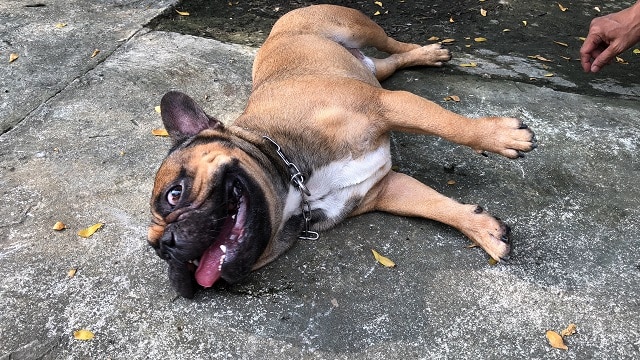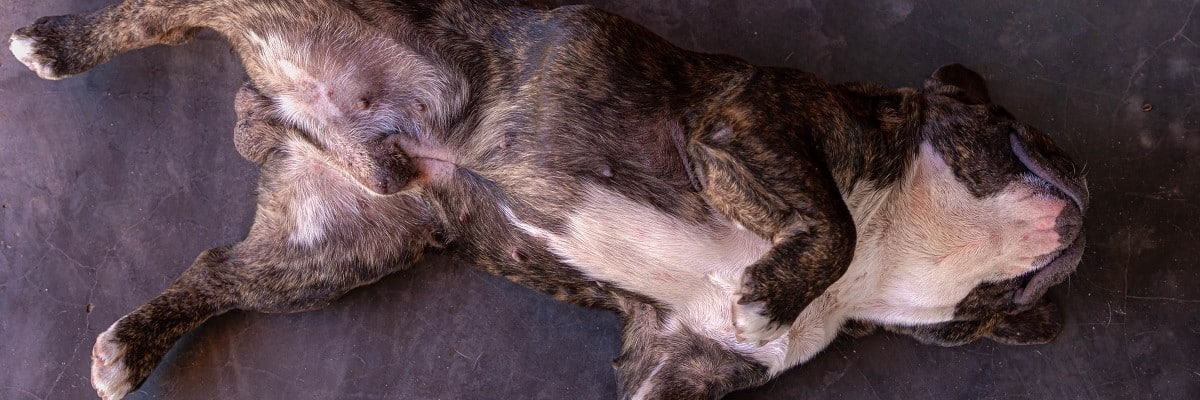French Bulldog Seizures: The first thing you must remember is to keep calm, Be close to your French Bulldog, Time your French Bulldogs seizures, and Lower your French Bulldog’s body temperature. Find out more below.
Seizures are a common neurologic (brain) condition affecting dogs, including French Bulldogs, and are most common. A pre-ictal phase can be identified by changing your Frenchie’s behaviour, as your French Bulldog may anticipate an upcoming event. You can break the episodes down into three parts.
The ictal phase is when the seizure occurs, usually lasting between a few seconds and up to five minutes. When your French Bulldog comes out of the seizure, it may be confused in the post-ictal phase. Frenchies experiencing convulsions lose control of their bodies, which can be frightening to them.
Even though it can be upsetting to see your French Bulldog suffer from a seizure, you should always remain calm. The seizure is scientifically known as an “ictus.” An involuntary, temporary disruption of brain activity causes a convulsion. Contacting a veterinarian to diagnose the underlying cause of a seizure is important due to the variety of reasons that can cause it.
Symptoms Of Seizures In French Bulldogs
A French bulldog seizure looks like this: French Bulldogs can experience seizures that vary in intensity and duration. A mild case may last for a short time, while a severe case may involve a loss of muscle control that lasts several minutes. There are some differences between a seizure and a fainting spell, though it may be hard to distinguish between them. It’s not uncommon for Frenchies to appear dazed or to stare off before they faint. French Bulldogs who faint generally do not defecate during the episode and usually recover quickly. You can identify seizures in dogs by looking at these symptoms.
| Kidney disease | Hypertension |
| Liver disease | Hypertension |
| Encephalitis | Electrolyte issues |
| Brain cancer | Stroke |
| Poisoning | Anemia |
| Head injury |
What do I do If My French Bulldog Has a Seizure?
Keep Your Self Calm
Try to keep yourself calm before you attend to your French Bulldog, whether this is your Frenchies first seizure or you’ve seen it before. You will only make them even more frightened if you start crying or yelling at them.
Be Close To Your French Bulldog
Sit near your French Bulldog, but be mindful about petting them. Sometimes, very carefully, you may be able to pet their back or other parts of their body that they cannot reach with their mouth. However, remember that your French Bulldog may bite uncontrollably during seizures. When you approach your Frenchie, they may be confused and bite you due to fear, pain, or confusion.
You might want to avoid petting your French Bulldog if he has a seizure for the first time, even if you find it emotionally draining.
Time Your French Bulldogs Seizures
Timing your French Bulldogs’ seizures is a good idea if you can. You can use a watch to determine how long your dog has been seizing. Your Frenchie should be fine if it lasts less than two minutes. If it lasts between two and five minutes, he should be taken to the veterinarian immediately.
A veterinarian should treat any seizure lasting more than five minutes. If your French Bulldog has several seizures in a short period without waking up between them, he must be seen by a veterinarian immediately.
Lower Your French Bulldog’s Body Temperature
The temperature of your French Bulldog’s body increases rapidly during seizures. This is why it may be helpful to cover their feet with a cool washcloth after he finishes the seizure. Before you do this, please wait until your Frenchie is awake since they might bite you otherwise.

Is A Seizure Painful Or Dangerous To Your French Bulldog?
While seizures may look violent and dramatic, they are not painful, although the Frenchie may feel confused and perhaps panicked. It is a common misconception that dogs swallow their tongues during seizures.
You will not be helping your French Bulldog by inserting your fingers into its mouth, and you risk being bitten or injured. There should be no harm or issues if it is lying on the ground or floor. It would be best if you prevented the Frenchie from falling or hurting itself by knocking into items.
An injury caused by a single seizure is very rare. It is important to note that if your French Bulldog has multiple seizures within a short period (cluster seizures) or if the seizures last more than a few minutes, your Frenchies body temperature will rise. Consequently, additional problems will be addressed if hyperthermia (excess body temperature) develops after a seizure.
Let Your French Bulldog Sleep, Eat and Drink
Your French Bulldog may be very tired upon becoming alert and awake again. However, you can periodically check in on them. Whenever you can, let them sleep.
After a seizure, your French Bulldog might also be very hungry or thirsty. Allow them to eat and drink if they appear alert and stand or look confused, but not if they do not force them.
Contact Your Veterinarian
If your French Bulldog has never experienced a seizure before or if the seizure has lasted longer than normal, call your veterinarian straight away for advice. Make sure you follow your vet’s instructions.
Your veterinarian may prescribe anti-epileptic medications if your Frenchie has epilepsy. You should speak with your vet to determine how to administer this medication to your French Bulldog and what side effects to expect.
It is important not to skip it, as it may result in your Frenchie suffering seizures again.
Little French Dog is a participant in the Amazon Services LLC Associates Program, an affiliate advertising program designed to provide a means for sites to earn advertising fees by advertising and linking to Amazon.com.
What To Do When The Seizure Stops Recap!
| After Seizure |
|---|
| Be sure to keep an eye on your French Bulldog while they recover. This could take several minutes or hours. |
| Do not be afraid to speak to them and to touch them. When your Frenchie wakes from a seizure, it needs reassurance. |
| Speak softly and remain calm. Dogs are better able to identify emotions and feelings than humans. If you are anxious, your dog will be anxious as well. |
| Note when and how long your French Bulldog had the seizure and what it looked like. This will help your veterinarian manage the situation. |
Your veterinarians hope to reduce seizures’ frequency and severity through treatment. Your vet will want to examine your French Bulldog physically and neurologically to do so. Additionally, evaluate your Frenchies’ complete blood count (CBC) and serum chemistry.
What foods can trigger seizures in French Bulldogs?
The following toxins found in food can cause seizures in French Bulldogs:
| Chocolate | Theobromine |
| Xylitol | Ethanol |
| Mushrooms | Caffeine |
Dogs are toxic to chocolate due to theobromine. The sugar-free sweetener xylitol is found in foods, gum, mouthwashes, and toothpaste. In addition to being used in hand sanitisers, solvents, and fuel, ethanol can also be found in apple, grape, and orange juices, sweet milk rolls, and burger rolls.
Xylitol is extremely toxic to dogs, causing seizures, vomiting, tremors, weakness, and lack of coordination/disorientation; it can also result in your pet going into a coma or causing liver failure.
Does honey help French Bulldogs with seizures?
Depending on how frequent or severe the seizures are, a teaspoon of honey once or twice a day is recommended for dogs who have diabetes or hypoglycemia. French Bulldogs with diabetes need veterinary care as well.
Can Seizures Cause Brain Damage In French Bulldogs?
Seizures can pose a serious health risk, and even a short seizure can cause permanent brain damage. Seizures are usually short, lasting less than 3 minutes, and can be treated properly so your French Bulldog can lead a normal life. A serious brain injury could occur if a prolonged seizure lasts more than 30 minutes.
How long can a French Bulldog live with seizures?
The average lifespan for French Bulldogs with epilepsy is eight years, compared to 11 years for those without epilepsy episodes. About 40-60 percent of epileptic French Bulldogs will have cluster seizures or status epilepsy.

